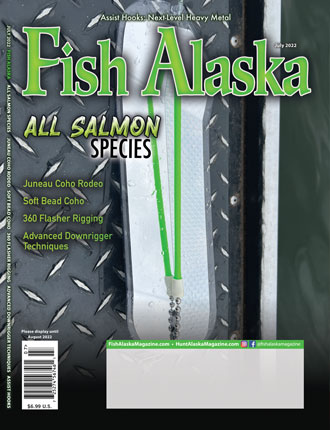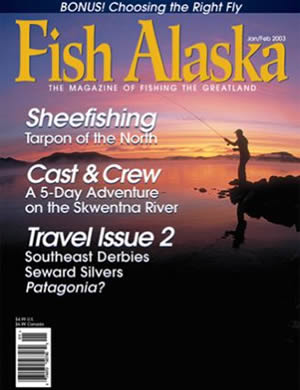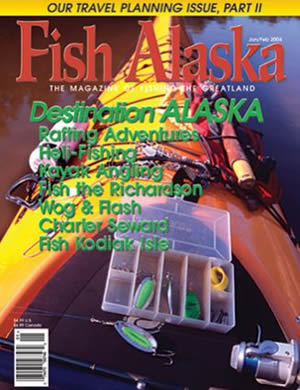Description
Departments
4 Fish Alaska Online
6 Alaska Traveler
8 Creel
10 Gear Bag
12 Fishing for a Compliment
14 Salmon Sense
18 Fly
20 Boats
30 Saltwater
32 Flyfishing
36 Conservation
79 Ad Index
80 Recipe
82 Final Drift
On The Cover
Brad’s Killer Fishing Gear 360 Evolution flasher has a built-in break-away and is adjustable to change its speed of rotation. The snubber may help keep fish buttoned, too. © George Krumm
42
Advanced Downrigger Techniques by Josh Leach
Lots of Alaska anglers use downriggers to target salmon in saltwater, and in freshwater for species like lake trout. Josh Leach fishes out of Larsen Bay in Kodiak all summer and has refined his downrigger fishing to minimize tangles and frustration, prevent downtime, and increase his clients’ hook-to-land ratio. Attention to detail is a must if you decide to replicate his very successful system.
50
360 Flasher Rigging—Breaking Away From Tradition by George Krumm
Every avid salmon angler has heard the term “360 flasher.” The 360-flasher craze (AKA Pro-Trollin’) has taken over much of the West Coast salmon angling scene. The only bad thing about 360 flashers is the atrocious hook-to-land ratio. George Krumm has been fishing 360s since 2015 and has experimented with everything from hook styles, to hook configurations, to break-away mechanisms to improve the hook-to-land ratio.
60
Soft Beads for Coho by Scott Haugen
In the late ‘80s and early ‘90s, 6- and 8 mm hard beads revolutionized trout and char fishing in Alaska streams. Roughly 30 years later, Soft Beads are doing the same in the steelhead and salmon rivers of the West Coast, including Alaska. Scott Haugen has been using Soft Beads since they became available five years ago. In this story, he expounds upon the use of Soft Beads specifically for coho in rivers.
70
Juneau Coho by Conor Sullivan
Thanks to consistently high plants of hatchery coho, Juneau boasts predictably good fishing along its road system. A boat isn’t necessary for success, and both fly and gear anglers can get in on the action starting in August and lasting through September. Thanks to a change in the brood stock used in hatchery production, the fish seem to be a little bigger than in years past, too.





